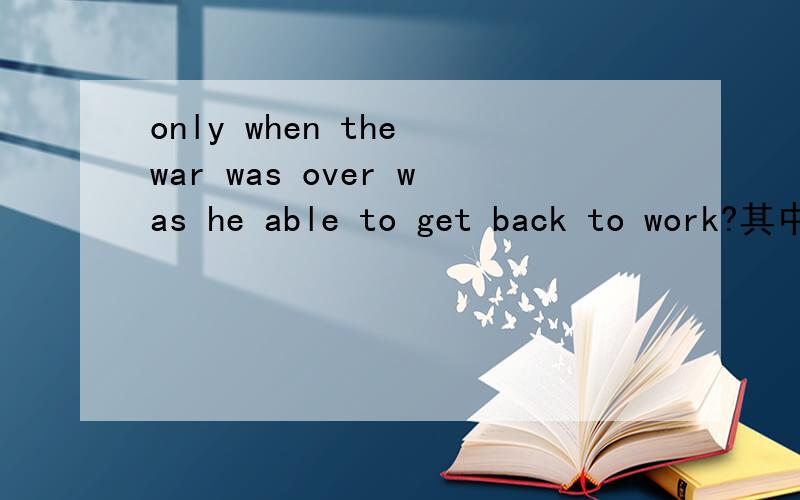only when the war was over was he able to get back to work?其中为什么会有was,这是什么语法?类似的还有:the supervisor could have prevented the accident had he known it beforehand.这里为什么会出现had?
来源:学生作业帮助网 编辑:作业帮 时间:2024/11/19 20:46:48

only when the war was over was he able to get back to work?其中为什么会有was,这是什么语法?类似的还有:the supervisor could have prevented the accident had he known it beforehand.这里为什么会出现had?
only when the war was over was he able to get back to work?其中为什么会有was,这是什么语法?
类似的还有:the supervisor could have prevented the accident had he known it beforehand.这里为什么会出现had?
only when the war was over was he able to get back to work?其中为什么会有was,这是什么语法?类似的还有:the supervisor could have prevented the accident had he known it beforehand.这里为什么会出现had?
嗯,楼上的人说的对,
第二句就是所谓的部分倒装:在虚拟语气中,若非真实条件句省略if,那么必须将主句中的were或had或should等助动词和主语位置颠倒形成的部分倒装.当然这一句中的if意为如果.你只要记住看见助动词提前,且没有句中连词出现,那个说明连词被省略了,而且被省略的连词,必定是if.
第一句你只要记住only还有一些否定的短语象not、only、not、until、never、neither、nor、hardly、little、scarely、seldom等 置于句首整句句子一律用部分倒装——助动词提前.
强调语气,虚拟语气倒装
"only when the war was over"为强调内容
正常的语句为he was able to get back to work only when the war was over.
翻译成:只有战争结束他才能回去工作,意思是实际上他不能回去工作,因为战争还没有结束.
第二句的翻译是:如果主管先前知道的话就能避免事故的发生,实...
全部展开
强调语气,虚拟语气倒装
"only when the war was over"为强调内容
正常的语句为he was able to get back to work only when the war was over.
翻译成:只有战争结束他才能回去工作,意思是实际上他不能回去工作,因为战争还没有结束.
第二句的翻译是:如果主管先前知道的话就能避免事故的发生,实际意思是事故无法避免,因为主管事先不会知道.
收起
第一个是倒装句,因为ONLY加时间状语在句前。
第二句实际上是相当于
the supervisor could have prevented the accident (if)he (had) known it beforehand这是虚拟句,当IF省略时,HAD要提前
"only when the war was over"为强调内容
正常的语句为he w...
全部展开
第一个是倒装句,因为ONLY加时间状语在句前。
第二句实际上是相当于
the supervisor could have prevented the accident (if)he (had) known it beforehand这是虚拟句,当IF省略时,HAD要提前
"only when the war was over"为强调内容
正常的语句为he was able to get back to work only when the war was over.
翻译成:只有战争结束他才能回去工作,意思是实际上他不能回去工作,因为战争还没有结束.
第二句的翻译是:如果主管先前知道的话就能避免事故的发生,实际意思是事故无法避免,因为主管事先不会知道.
收起
第一个是倒装句,因为ONLY加时间状语在句前。
第二句实际上是相当于
the supervisor could have prevented the accident (if)he (had) known it beforehand这是虚拟句,当IF省略时,HAD要提前